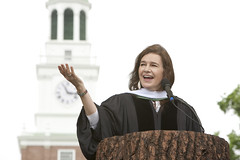Louise Erdrich, The Blue Jay’s Dance: A Birth Year. Harper Collins, 1995.
I wish I’d read The Blue Jay’s Dance a year and a half ago, when I was trying to rebuild my writerly self eighteen months after the birth of my son. In a flurry of frustration and aloneness, I read everything I could find on writing and mothering: Tillie Olsen, Adrienne Rich, Alice Walker, Sylvia Plath. For some reason, Louise Erdrich’s book never made it onto my horizon before now.
It’s the book I was looking for back then.
The Blue Jay’s Dance tells about writing and mothering in the first year of a baby’s life. Erdrich had six (six!) children when she wrote this book. The first three were adoptive kids who came with her husband into their marriage, the second three were all girls she birthed. The baby in the book is a composite of this latter trio.
Erdrich’s text shows how writers work: it stages the stillness, quiet, and observation that a life of writing requires, and the walks, musings and meanderings needed for story-telling, invention and problem-solving. She watches insects, flowers, and birds with an interest that is both scientific and poetic, and writes about the small and everyday in way that is absorbing. She describes the pleasure of nursing and the pain of birthing without cuteness, gore or cliché. And she tells with refreshing honesty how writing and love are occasionally at odds:
Women writers live rose nights and summer storms, but like the blue-eyed jumping spider opposite our gender, must often hold their mates and families at arm’s length or be devoured. We are wolf spiders, carrying our babies on our backs, and we move slowly but with more accuracy. We learn how to conserve our energy, buy time, bargain for the hours we need. (143)
The Blue Jay’s Dance is an intensely bittersweet book. It’s about birth, but also about death – of grandparents and beloved animal companions. It’s about how time goes too fast, and how we both want our kids to grow and to stay little forever. It’s about the realization that when your baby is big, you will be old, and about how every minute gained for writing and work comes at a price. It’s about parenting with a lover and colleague, and staying strong and unified when it’s easier to divide and resent.
I didn’t want this book to end. When it did, curiosity got the better of me, so I did a quick search to find out more about Erdrich.
It was devastating.
This woman, so positive, brilliant and balanced, and who thrice came through the Year-One-Firestorm of Motherhood intact, had the carpet pulled out from under her soon after The Blue Jay’s Dance was published. First: divorce from Michael Dorris (the dissolution of the “literary love affair of the century”), ugliness surrounding alleged sexual abuse of the adoptive children by Dorris, and finally Dorris’s suicide.
All this fills with me with a deep sense of compassion and admiration for Erdrich who has continued, despite all of this, to work amazingly well.
Just last year she was nominated for a Pulitzer Prize.
[Photo of Louise Erdrich at Darmouth by Joseph Mehling]


